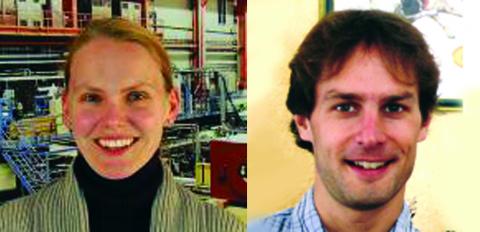
Two TRIUMF scientists shared their passion for physics with Canadian undergraduates as part of this year's Canadian Association of Physicists (CAP) Lecture Tour. Cornelia Hoehr spoke to students at Brandon University and the University of Manitoba earlier this month, while Ruediger Picker visited Thompson Rivers University and the Universities of Calgary and Lethbridge in February.
The CAP lecture tour is designed to bring the excitement of current physics developments to the classroom by connecting dynamic, engaging scientists with undergraduate students. The tour's fifteen speakers were nominated and selected by colleagues based on "their outstanding ability to present an exciting topic in physics with clarity and enthusiasm." It was up to students to choose which speaker they would like to hear, according to their field of interest.
Hoehr presented a lecture on the role of nuclear physics in the diagnosis and treatment of cancer. She outlined the use of Positron Emission Tomography (PET) radiotracers to find and stage cancer and monitor its response to treatment, allowing for more personalized medicine. She also spoke about TRIUMF's Proton Therapy Centre – the only facility of its kind in Canada - which uses proton beams from the main cyclotron to treat ocular melanoma, a type of skin cancer that grows at the back of one's eye.
"I try to show students what they can actually do with the physics they are learning everyday," Hoehr explains. "It's also an opportunity to reach students who don't know what we do at TRIUMF and give them the idea that it might be a good place to learn, through a co-op term or during their graduate studies."
Picker introduced TRIUMF's new Ultra-Cold Neutron (UCN) facility in his lecture "The (ultra-cold) neutron and the universe." When complete, the UCN facility will produce the highest-ever density of UCN, enabling a new generation of experiments into the fundamental properties and interactions of neutrons. Picker outlined how knowledge obtained from these experiments will help us to understand many of the 'big questions' in physics, such as the universe's matter-antimatter asymmetry.
For Picker, who arrived in Canada last April, the tour offered an opportunity to become acquainted with various universities in Western Canada (while also experiencing the Rocky Mountains from his car window along the way). Both scientists were warmly welcomed and peppered with thoughtful questions at the conclusion of their talks. The lectures provided students with a better understanding of some of the most active topics in physics today, while also giving them an opportunity to consider their future research interests.
The experience was rewarding for scientists as well as students. As Picker explains, "It's fun to have the opportunity to fascinate people with the very specific topic in physics that I'm working on."
-Lindsay Kroes, Communications Assistant
